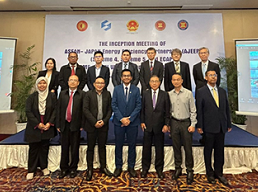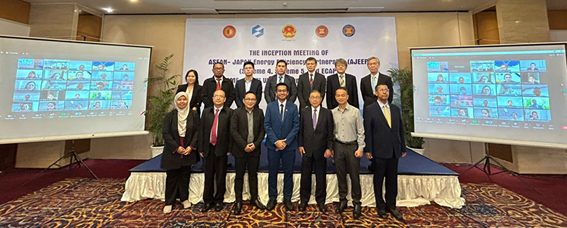
ECCJ held the FY2023 inception meeting of the energy conservation support project for ASEAN countries
<Meeting>
Under the instruction and financial support of the Ministry of Economy, Trade and Industry (METI) in its “decarbonization and energy transformation project for newly emerging nations, etc. (EE&C capacity building program)”, the Energy Conservation Center, Japan (ECCJ) held the Inception Meeting of the current fiscal year’s AJEEP (ASEAN-Japan Energy Efficiency Partnership) project in a hybrid in-person/online format over the two-day period from August 3 to 4, 2023 in Ho Chi Minh, Vietnam. At the meeting held this time, the results of the following two schemes which started from the previous fiscal year were confirmed, together with the implementation plans for the current fiscal year.
(1) Establishment of qualification systems relating to ASEAN common energy management and its application (Scheme 4)
(2) Popularization and promotion of energy usage technologies for realizing carbon neutrality (Scheme 5)

At the meeting, there was in-person participation from Thailand as the representative country of the Energy Efficiency & Conservation – Sub-Sector Network (EE&C-SSN) and six other countries together with the ASEAN Centre for Energy (ACE) as the coordinator, while four other countries participated online. The main details of the activities were as follows.
(1) In the meeting’s opening remarks, representatives from the host country Vietnam’s Ministry of Industry and Trade (MOIT), the Thai Department of Alternative Energy Development and Efficiency (DEDE) as the EE&C-SSN coordinator and from ACE spoke about their expectations that the implementation of the two schemes linked with the APAEC* Phase II activities will result in deeper energy management in the ASEAN region and specific developments such as carbon neutrality audits for realizing carbon neutrality. ECCJ emphasized the fact that it is essential to steadily proceed with activities to realize carbon neutrality (CN) even while the global energy environment is rapidly changing, and that energy efficiency & conservation in particular is the “primary fuel” as the basis for realizing CN.
(2) As the Scheme 4 activities, the formulation of a common standard module required for certification of qualified energy managers (SAEMAS* Energy Management Professionals) in the ASEAN region, and the development of MRA guidelines relating to mutual recognition between the ASEAN regional system allowing certified qualified energy managers to conduct activities throughout the ASEAN region and systems in each country were confirmed. Additionally, it was also decided to begin formulating the advanced modules for certifying the expert human resources who can develop, operate and manage CN related projects in building and factory sites.
(3) Scheme 5 has the objective of formulating and promoting CN projects, in which specific activities will be implemented, ranging from CN audits to the formulation of medium and long-term plans. Additionally, the current fiscal year’s CN audit candidate companies were discussed, and it was decided to select a Malaysian chemical manufacturing factory and a Thai public hospital. CN audit guidelines and CN audit procedures were also introduced.
Agreement was reached that the various activities described above should be effectively implemented through face-to-face methods including dispatches of experts and invited training conducted in Japan as the core activities while also holding seminars and workshops online. The annual program schedules were also agreed.
* APAEC: ASEAN Plan of Action for Energy Cooperation
* SAEMAS: Sustainable ASEAN Energy Management Certification Scheme

